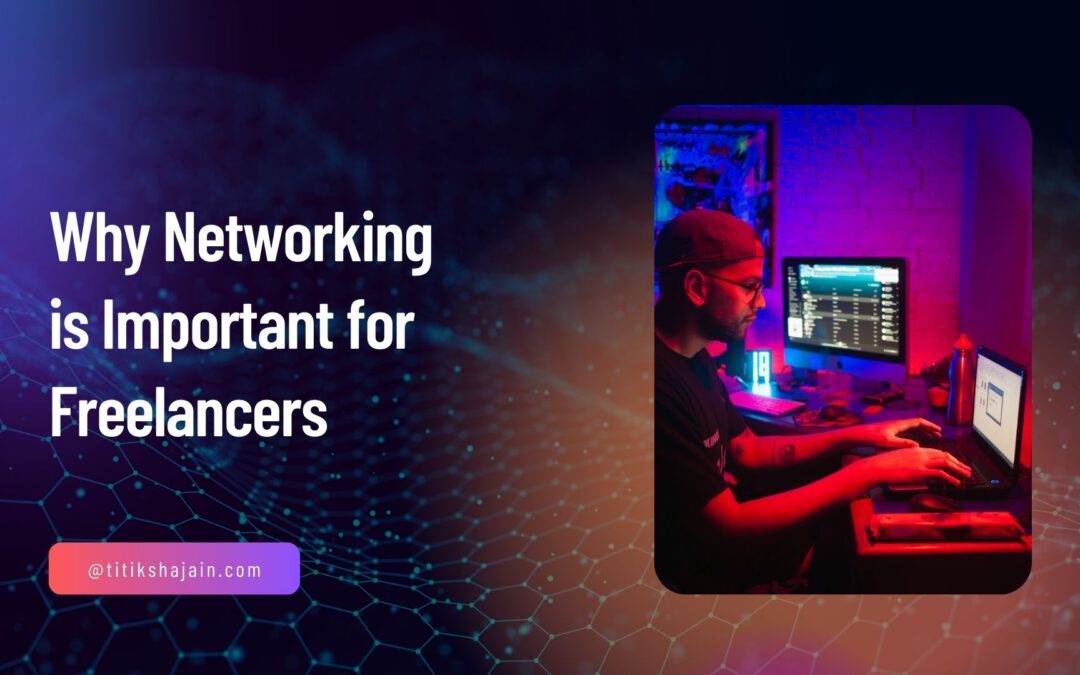Networking is important for freelancers because it helps you find clients, build trust, learn new skills, and grow your business faster. Strong connections often lead to referrals, collaborations, and long-term work opportunities—making networking just as important as your technical skills.
Contents
- 1 1. Networking Helps You Find Clients
- 2 2. Referrals Bring More Work
- 3 3. Networking Builds Trust and Credibility
- 4 4. Learning From Other Freelancers
- 5 5. Collaboration Opportunities
- 6 6. Emotional Support and Motivation
- 7 7. Access to Hidden Opportunities
- 8 8. Stay Visible in a Competitive Market
- 9 9. Long-Term Business Growth
- 10 Final Thoughts
- 11 FAQs
1. Networking Helps You Find Clients
One of the biggest challenges freelancers face is finding clients. While freelancing platforms and job boards exist, competition is high. Networking opens doors to clients who may never post jobs online. By attending events, joining online communities, or even chatting on LinkedIn, you can get direct access to opportunities.
Example: Many freelancers have landed their first client just by joining a Facebook group or replying to someone’s LinkedIn post.
Learn more about finding clients as a freelancer (Forbes).
2. Referrals Bring More Work
When you build good relationships, people recommend you to others. Referrals are one of the easiest ways to get new projects because they come with built-in trust. A happy client might connect you with their colleagues, or a fellow freelancer might pass on work they can’t take.
3. Networking Builds Trust and Credibility
Clients are more likely to hire freelancers they feel connected to. Networking allows you to showcase your personality, reliability, and expertise. Even a simple introduction or helping someone in your niche can build trust over time.
For tips on building credibility, check out How to Start Freelancing with No Experience
4. Learning From Other Freelancers
Networking isn’t just about finding clients—it’s also about learning. By talking to other freelancers, you can discover new tools, strategies, or platforms you didn’t know about. This helps you stay updated in the fast-changing digital world.
Freelancer yazhinisivakumar.com often highlights how connecting with peers creates valuable learning opportunities.
Also read: HubSpot – Networking Tips for Freelancers– https://offers.hubspot.com/professional-networking-tips
5. Collaboration Opportunities
Networking can lead to partnerships. For example, a web designer might collaborate with a copywriter, or a social media manager might team up with a graphic designer. Together, you can offer complete solutions to clients and win bigger projects.
6. Emotional Support and Motivation
Freelancing can feel lonely. Networking gives you a sense of community. When you meet people who understand your struggles, you feel less isolated. Sharing wins, challenges, and advice can keep you motivated.
7. Access to Hidden Opportunities
Not every job or project is posted online. Many high-paying or long-term opportunities are shared within private circles or by word-of-mouth. By networking, you get access to these hidden opportunities that most freelancers miss.
8. Stay Visible in a Competitive Market
Freelancing is competitive, and clients are more likely to remember freelancers they’ve interacted with. Networking keeps you visible and top-of-mind, which increases your chances of being hired when opportunities arise.
9. Long-Term Business Growth
Strong networking doesn’t just give you one-time projects—it creates long-term opportunities. Over time, your network becomes your biggest source of leads, referrals, and collaborations. Many successful freelancers get most of their work through their connections, not platforms.
Final Thoughts
For freelancers, networking is more than just a side activity—it’s a core part of growing your career. Whether it’s building trust, finding clients, or collaborating with others, networking opens doors that skills alone cannot. Start small, be genuine, and stay consistent—your network will become your strongest asset.
FAQs
1. Do I need to be an extrovert to network as a freelancer?
No. Networking can be as simple as commenting on posts, joining groups, or sending a friendly email.
2. Where can freelancers network online?
LinkedIn, Facebook groups, Slack communities, Twitter, and local freelancing forums are great places to start.
3. How does networking help beginners with no experience?
Networking gives beginners visibility and access to clients who are willing to trust new freelancers through personal connections.
4. What’s more effective: online networking or offline events?
Both are effective. Online networking gives global reach, while offline events help you form deeper, personal connections.
5. How much time should I spend networking as a freelancer?
Even dedicating 20–30 minutes a day to networking can make a huge difference in building long-term opportunities.

